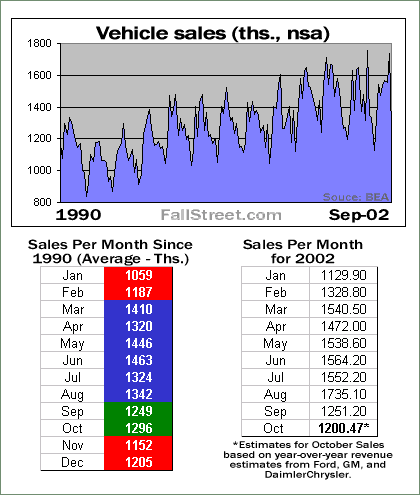November 4, 2002
The Coming Shakeouts
Shakeout # 1
Harvey Pitt is as good as gone and William H. Webster says he may call it quits after serving as head of the new U.S. accountancy regulatory board for less than 1-week. What will happen to the markets if both Pitt and Webster are ousted?
The reason why the removal of Pitt and/or Webster is important is because neither of these individuals stand for change. Rather, beyond his grand plans for an SEC appointed accounting board, something companies were queasy about when real reformer John H. Biggs was thought to be the leading candidate, Pitt does not have a disagreeing bone in his body. As for Webster – he has no accounting experience whatsoever. Enough said.
Accordingly, the near term danger for the markets is that Pitt or Webster leaves and someone like Biggs takes charge. As a quick example of how this could shake things up, Biggs is for expensing stock options, Pitt is against, and although Webster’s position is unknown he was fond of receiving copious amounts of stock options when he served on U.S. Technologies Board (he never did get to exercise (sell) his options). Accounting for stock options alone would make 3Q02 earnings results look less appealing. Under current standards we will not find out until annual reports are released of the impact of stock options in 3Q02, and even then only footnote readers, not Wall Street and media reports on earnings, will highlight these costs.
Will Bush be able to quickly round up some new yes men, or will someone who actually wants to shake things up acquire one of the positions?
Incidentally, anyone who still has any doubts as to whether or not Harvey Pitt is the wrong man for the job need only consider one thing: he has been SEC boss for more than a year and no one has ever argued that he has been too tough on companies or accountants. Think about it: the window for change was flung open following Enron and Worldcom – an astute SEC Chairman could have stamped a set of new and meaningful accounting standards. Instead, Pitt’s promises for tangible change notwithstanding, all Harvey has done is made CEOs and CFOs sign financial statements they have been signing for more than two decades. Moreover, and this will likely be proven when the next Enron arrives, when it comes to ‘certification’ ignorance is still a defense.
Shakeout #2
The strong automobile market has been a pillar for the U.S. economy since late 2001, or when the manufacturers first began offering fantastic price incentives to customers. However, auto sales have begun to slide; partly because of seasonality trends but mainly because ‘zero percent interest’ does not absolve increasingly frugal consumers from worrying about principle payments. In sum, today it is a forgone conclusion that an automobile should only be sold with a giant ‘0%!’ sticker on it – the mad rush from consumers worried about missing out on fantastic deals, which remarkably lasted nearly a year, is over.
 |
November to February are the slowest 4-months for auto sales, Sept-Oct sales are already showing weakness, and consumer confidence is in the gutter. The shakeout in automobiles is well underway.
Shakeout #3
As ridiculous as it may seem, bear/bull sentiment readings from Investor ‘Intelligence’ contend that investor’s are more enthusiastic about Dow 8,517 than they were about Dow 7,197. For those of you keeping score, this is an 18% advance – investor’s are more bullish on stocks after an 18% advance.
The debate on whether or not gains in stocks will be sustained centers on those pesky ‘rear-view’ economic numbers. The bullish, or should is say biased?, argument goes that today’s economic reports are yesterday’s news. After all, the consumer is probably feeling a little bit better than they did during October because the markets have rallied, companies are probably going to stop laying off workers because… (I am not sure of the logic for this one), and the stock markets could sustain strength because the markets typically rally during the November-May period. These are some of the arguments used to divert attention away from the fledging U.S. economy.
An applicable analogy to describe the stock market/economy disconnect is that of a cat playing with a ball of yarn – the excitement builds as the ball rolls rapidly across the floor, but at what point does the cat begin to figure out that the ball of yarn is rapidly unraveling? Suffice it to say, ayone who actually believes the markets can ignore an unraveling U.S. economy must really be enjoying the current stock market rally.
The last, and most ominous shakeout, will be when the markets retest their previous bottoms. This week’s main events are the elections (Tues) and the FOMC meeting (Wed). Noteworthy also are factory orders (today) and the ISM Services Index (Tues). With 3Q02 earnings excitement dissipating don’t be surprised if the markets begin to mirror the economy more closely. As well, remember the phrase ‘Fed Seen Lowering Rates in Rescue Bid’. Investors may be cheering another rescue attempt by the Fed but there is no guarantee that the U.S. economy can be saved. By contrast, it can almost be guaranteed that the markets will once again ‘retest’ if the Fed fails...
|
|

All data and information within these pages is thought to be taken from reliable sources but there is no guarantee as such. All opinions expressed on this site are opinions and should not be regarded as investment advice.
Copyright © 2000, 2001, 2002
FallStreet.com